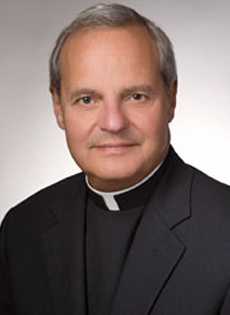
Developing leaders to save the Earth
Monday, August 16, 2010
*Msgr. Franklyn Casale
Environmental concerns and BP are almost synonymous today. Long before the tragic oil spill in the Gulf of Mexico occurred, however, people were beginning to realize that the environment was becoming a prominent feature of global consciousness and development.
Many private and public businesses and government institutions have already made the effort to reduce their carbon footprint. Families pitch in, in their own ways, to preserve the beauty of God’s creation. Our Holy Father, Pope Benedict XVI, has said regarding the environment, “The environment is God’s gift to everyone, and in our use of it we have a responsibility towards the poor, towards future generations and towards humanity as a whole.”
As educators, parents and responsible citizens of the world, we are required to care for our planet. Thinking locally, we can start by instilling an environmental concern in our youngsters’ minds, encouraging them to get a science degree or, as adults, attending high-level informational events where we can examine current issues with detail. Communities and non-governmental organizations may come up with ecological programs but little will be accomplished if the public sector neither creates the right legislation nor executes the necessary action steps to propel the plan.
St. Thomas University recently created an LL.M. program in Environmental Sustainability. The degree in the law school is a result of the collaboration between Barry University and St. Thomas University’s law schools as well as funding by the Adrian Dominican Sisters to establish a Center for Earth Jurisprudence.
This new degree will be not only for lawyers but for all professionals who will be dealing with the increasingly complex matters affecting the environment. Every corporation, every non-profit, every university and every business at this point is subject to some type of environmental law and will need people trained to ferret out the different issues and keep track of increasing regulations.
This July, Barry University and St. Thomas University’s law schools hosted a conference on ecological integrity, which covered topics such as reconnecting humans, providing health care for the poor and coming up with solutions to the habitat. World-renowned environmentalist and Right Livelihood Award (the “alternative to the Nobel Prize”) winner Dr. Vandana Shiva discussed ecological integration and the urgency of protecting the earth’s biological diversity in the context of small-scale organic agriculture. Dr. Mira Shiva, director of The Initiative for Health Equity and Society, explored links between ecological integrity and public health issues affecting vulnerable populations. Other experts included Leonie Hermantin, deputy director of the Lambi Fund, who discussed Haiti’s rebuilding plans.
St. Thomas University also made the decision some years ago to create an outstanding science program. The program is housed in the state-of-the-art Carnival Cruise Line Science and Technology building. Our highly qualified faculty are conducting extensive research, funded by government grants, with all our undergraduate students who major in science.
The United States will be facing a shortage of scientists in the near future. On the positive side, we will protect the planet through innovations made by America’s future scientists, as today’s students carry out scientific research in aquatic habitat facilities, study plant growth environments, specialize in other science fields or study environmental law. As an academic institution we desire to do our part to train and inform our students to become leaders in maintaining the Earth and providing for the healthy development of God’s people.


Comments from readers
However, is it enough? Could the effort of �developing leaders to save the Earth� be expanded to other schools at STU? I am suggesting a project from the School of Theology and Ministry in which the Catholic Social Teaching on the environment be taught and reflected to help in the development of a moral conscience towards our responsibility to the environment.
This project will follow the successful path set for the Science program and the Law School. Also, this project could involve other schools at STU, or other universities, such as FIU's organic garden. As an IPM graduate (2007) and someone concerned for the environment, I offer myself to be part of this initiative.
Responsible Christians know about Creation and how we should keep our environment clean. We do not need overly zealous movements.